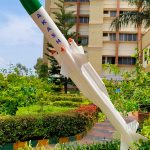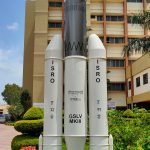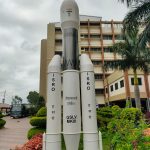Archives
Computer Science & Engineering (Internet of Things)
Department Of Physics
BBA (Bachelor of Business Administration)
BCA (Bachelor of Computer Applications)
Overview:
The BCA Department was initiated in the year 2024 with an intake of 60 students. The laboratories at the BCA Department are well-equipped, and the faculty members are qualified with committed in nature. The department has state-of-the-art technology and smart classrooms. Students are prepared with an ideal blend of computer application abilities and ready for industry.Our courses forte to strengthening front-line developers in web-based enterprise solutions, embedded systems, and networking. The students are equally competent in open source as well as proprietary software’s and can adapt to either technology.
Vision:
Our vision is to train the next generation of leaders in technology, business, application development, information technology (IT) and entrepreneurship, so that they can serve the benefit of Society.Mission:
1.To facilitate innovative learning and application through the integration of diverse knowledge with industry.2.To promote individuals with skills in utilizing technology and digital intelligence.
3.To foster technological business start-ups that provide education that produce entrepreneurs to benefit society.
4.To ensure the student connects at a personal level and focuses on holistic development with Intellectual, Emotional, Spiritual and Behavioural personalities.
Course Name:
Bachelor of Computer Applications (BCA)Duration:
BCA 3 Years / BCA (Honors) 4 yearsEligibility
Marks – General — 40%Marks – SC / ST / OBC – 35%
Eligibility – Subjects
A candidate who has passed a two-year Pre-University Course (PUC) Examination conducted by the Pre-University Education Board, Government of Karnataka, or 10+2 Examination conducted by CBSE or equivalent examinations by any Other State or any other recognized Board / Department or 3-year Diploma in Commercial Practice Course or equivalent. A candidate with PUC / 10+2 of any stream shall be eligible.
Admission to 1st year:
Eligibility for candidates Passed in second PUC or equivalent,
1.As notified by the Government of Karnataka from time to time.
2.Those students, who have passed a qualifying examination other Than the PUC II examination of the Pre-University Education Board of Karnataka, have to obtain an eligibility certificate for seeking admission to I year BCA Degree Programme from the University.
Admission Procedure:
The University shall issue a notification for admission to various UG Programmes for all odd semesters soon after the announcement of PUC II year / 10+2 results. Admissions shall be purely based on merit cum roster as per the norms of the Government of Karnataka issued from time to time. The academic year normally commences in June every year. The exact date for commencement of the academic year shall be decided by the University. Affiliated colleges shall admit students for each program not exceeding the approved intake. Prior approval from the University is mandatory in case the admissions exceed the approved limit.Eligibility – Exam
A candidate seeking admission to a Bachelor’s degree (BCA) in a specified field of learning shall have passed the relevant three-year bachelor’s degree with minimum CGPA of 7.5 is eligible to continue the fourth year undergraduate programme.1.A candidate can seek admission to the 7th Semester in any College running Honors Programme subject to the availability of intake capacity of such Major Courses in the College.
2.There shall be a provision for carryover system from 7th to 8th semester, subject to the fulfilment of 75% attendance in each Course and submitting the examination application form.
Infrastructure:
- Java Programming Lab
- DBMS Lab
- Data Structure Lab
- IoT Lab
- Python Lab
- Web Technologies Lab
- Computer Networks Lab
M.Tech in Structural Engineering (Civil)
Overview:
The M.Tech in Structural Engineering is a postgraduate program designed to provide in depth knowledge and advanced skills in the analysis, design, and construction of complex structures. This program integrates theoretical concepts with practical applications to prepare students for careers in academia, research, and industry.Vision
The goal is to establish a center of excellence in academics, research, and consultancy by delivering high-quality education and developing skilled civil engineering professionals who are ethical, socially conscious, and dedicated to contributing to the improvement of society.Mission
1. To equip civil engineering students with the knowledge and skills necessary to address complex engineering challenges and excel as leaders in diverse career paths. 2. To nurture competent civil engineering professionals by fostering collaborations with professional organizations, research institutions, and industries for societal advancement. 3. To establish a reputation as a center of excellence in research and development, offering innovative solutions to civil engineering problems. 4. To cultivate a dynamic learning environment that empowers students and staff with boundless opportunities to achieve career excellenceKey Highlights of the Programme
1. Duration:
o 2 years (4 semesters)
2. Eligibility:
o Bachelor's degree in Civil Engineering or a related field with a qualifying percentage/CGPA.
o Valid GATE score (if applicable).
3. Program Objectives:
o To equip students with advanced knowledge in structural analysis and design.
o To develop expertise in using modern tools for structural modeling and simulation.
o To enhance problem-solving skills for addressing real-world structural challenges.
o To foster research capabilities for innovation and sustainability in structural engineering.
4. Core Subjects:
o Advanced Structural Analysis
o Design of Reinforced Concrete and Steel Structures
o Finite Element Analysis
o Earthquake-Resistant Design of Structures
o Structural Dynamics
o Prestressed Concrete Structures
5. Elective Subjects:
o Bridge Engineering
o Tall Buildings and Special Structures
o Industrial Structures
o Forensic Structural Engineering
o Advanced Construction Materials
6. Hands-On Learning:
o Use of advanced software like STAAD.Pro, ETABS, SAP2000, and ANSYS.
o Laboratory experiments for material testing and structural behavior analysis.
7. Research Opportunities:
o Dissertation on innovative topics under expert guidance.
o Collaboration with industries and research organizations.
8. Career Prospects:
o Structural Engineer in construction and design firms.
o Research and Development roles in advanced structural systems.
o Consultant for large-scale infrastructure projects.
o Academic and teaching positions.
9. Program Outcomes:
o Graduates with expertise in designing safe, sustainable, and cost-effective structures.
o Leadership and problem-solving skills for diverse professional environments.
Career Opportunities in Structural Engineering
Structural Engineering offers a wide range of career opportunities for graduates and professionals, catering to diverse industries and roles. As an essential discipline within civil engineering, it ensures the stability and strength of infrastructures. Here are the prominent career paths and opportunities:1.Structural design of buildings, bridges, dams, towers, and industrial structures by computational analysis using tools like STAAD.Pro, ETABS, or ANSYS.
2.Overseeing construction projects to ensure design compliance and safety standards and coordination with multidisciplinary teams for project execution.
3.Development of innovative materials, methods, and sustainable design solutions.
4.Working as a consultant for infrastructure projects, offering expertise in structural safety, retrofitting, and renovation.
5.Employment in government departments like Public Works Department (PWD), National Highways Authority of India (NHAI), or municipal corporations.
6.Establishing structural design or consulting firms.
7. Working on international projects that require expertise in global standards such as Eurocodes or ACI standards.
Computer Science and Engineering (IOT)
Overview
In the academic year 2023-2024, the Department of Computer Science and Engineering (IoT) was started with a 60 students intake. In order to prepare students for careers in IT, computer technology, communications networks, and other sectors that have a wide variety of applications in the Internet of Things, the program seeks to give them with comprehensive professional knowledge and strong practical skills. Students who complete the program will be well-equipped to plan and develop sensor networks for the Internet of Things. The subjects covered include: IoT Introduction Data and Knowledge Management, and the Use of Devices in IoT Technology: A Market Perspective on IoT gaining an understanding of IoT architecture and its use in diverse technologies. The focus of these classes is on helping students acquire the skills they need to.
Advances in IoT have opened a whole new realm of opportunities in many areas of our connected digital society. We the Department of Computer Science and Engineering – IoT at ACSCE offer quality undergraduate program in an technical environment integrated with engineering practices, research and continuing professional education.
The Department was started in the year 2023 with a sanctioned intake of 60 students and aims to create a vibrant learning ecosystem, where every single student is professionally groomed to full-fill the needs of new era of IoT and its Technology.
The Department aims to:- Offer strong fundamentals through learner centric approach.
- Encourage technical, interpersonal, interdisciplinary skills and logical thinkingfor holistic development of the students.
- Enable students to handle various aspects of IoT issues in real time scenarios.
- By creating best career opportunities by arranging in-house progressive training, projects and internships with cooperation of MoU rated organizations, it helpful in polishing their skills.
- Enhance employability of students by empowering them with technical competencies, domain skills, leadership skills, techno-managerial qualities, and communicative abilities to make them industry ready.
Vision
To be an exemplary centre for education and training in the frontier areas of computing in IoT to resolving the societal problems.
Mission
- Strengthening the learning environment that facilitates the quality of education in the domain of IoT.
- To foster professional ethics and values with concern for environment and society toprovide sustainable solutions.
- Towards on passion for research, entrepreneurship, higher studies or professional growth through life-long learning.
Duration:
4 YearsEligibility:
- Marks – General: 45% Aggregate
- Marks- SC/ST/OBC: 40% Aggregate
- Eligibility Subject: Physics, Chemistry, Mathematics
- Eligibility – Exam: 10+2 (Physics, Chemistry, Mathematics) with CET/COMED-K/JEE any one Rank is compulsory
- Lateral Entry (Admission to 2 nd Year): 10+3 (Diploma in Engineering)
Accreditation, Approvals, and Recognition
- Approved by AICTE
- Affiliated to VTU
Career Opportunities
IOT Career Opportunities:- Data Analytics: Making sense of data collected by IoT devices.
- Network and Networking Structure: Managing the communication infrastructure.
- Cyber Security Specialist: Secure IoT networks and Device.
- Hardware and Devices: Developing IoT devices.
- IoT Consultant: Provide expertise and guidance on IoT projects..
- Sensors and Actuator Professional: Working with sensors and actuators.
- Embedded System Engineer: Creating PCBs and firmware.
- Artificial Intelligence: Applying AI techniques to IoT.
Infrastructure
Department has very good infrastructure comprising of separate space for different laboratories. Some of the Labs are Computer Programming Lab, Data structure Lab, Analysis and Design of Algorithm Lab.Each system is configured with intel core i5 built in with windows11 .
Laboratory Facilities
The students should be able to:- Identify a issue and derive problem related to society, environment, economics, energy and technology
- Formulate and Analyze the problem and determine the scope of the solution chosen
- Determine, dissect, and estimate the parameters required in the solution. Evaluate the solution by considering the standard data / Objective function and by using appropriate performance metrics.
- Compile the report and take part in present / publishing the finding in a reputed conference / publications
Design and Analysis of Algorithms Laboratory
This course (BCSL305) will enable students to:- Design and implement various algorithms in JAVA
- Employ various design strategies for problem solving.
- Measure and compare the performance of different algorithms.
Computer Science and Engineering (Data Science)
Overview
In the academic year 2022-2023, the Department of Computer Science and Engineering (DATA SCIENCE) was started with a 60 students intake. Data science is a multidisciplinary field that uses scientific techniques, procedures, algorithms, and systems to glean knowledge from both structured and unstructured data. Technically speaking, data science integrates statistics, data analysis and machine learning to comprehend and examine real-world occurrences. In addition to computer science, data science also makes use of methods and concepts from the domains of mathematics and statistics. The three main parts of data science are data organization, data packing, and data delivery which examine data, and the outcomes of that examination are utilized to make judgments and come to conclusions.QUALITY POLICY:
Engage the stakeholders in the department’s process of ongoing improvement and also teach students the value of updating the real-world applications.VISION
To achieve global proficiency in computer science and engineering (data science) by developing technically skilled professionals who can serve as innovative data analytics researchers, driving novelty and addressing societal challenges.MISSION
- M1: To provide holistic learner centered approaches to enhance analytical and leadership skills
- M2: To strengthen the core competences in the domain of computer science and engineering (data Science)
- M3: To use innovative teaching learning processes for building real-time applications leading to lifelong learning.
PROGRAM EDUCATIONAL OBJECTIVES (PEO’S)
PEO-1 Graduates with strong foundations in computer science and engineering capable of solving real-world problems using artificial intelligence and data-analytics
PEO-2
Graduates will adapt to professional development using data science technologies and possess excellent communication and leadership skills.
PEO-3
Graduates will process professional ethics and be committed to development of the society, providing engineering solutions with a focus on data security
PROGRAM SPECIFIC OUTCOMES (PSOs)
PSO-1: Apply mathematical models and statistical methods to solve complex engineering problems using knowledge of computer science and data science.
PSO-2: Building multi-disciplinary innovative projects using artificial intelligence models and data science.PROGRAM OUTCOME (POs)
PO1 – Engineering Knowledge: Apply knowledge of mathematics and science, with fundamentals of Aerospace Engineering to be able to solve complex engineering problems related to Aerospace EngineeringPO2 – Problem Analysis: Identify, Formulate, review research literature and analyse complex engineering problems related to Aerospace Engineering and reaching substantiated conclusions using first principles of mathematics, natural sciences and engineering sciences.
PO3 – Design/Development of solutions: Design solutions for complex aircraft problems related to Aerospace Engineering and design system components or processes that meet the specified needs with appropriate consideration for the public health and safety and the cultural societal and environmental considerations.
PO4 – Conduct Investigations of Complex problems: Use research–based knowledge and research methods including design of Aircraft and Aerospace structure experiments, analysis and interpretation of data, and synthesis of the information to provide valid conclusions.
PO5 – Modern Tool Usage: : Create, Select and apply appropriate techniques, resources and modern engineering and IT tools including prediction and modelling to Aerospace Engineering related complex engineering activities with an understanding of the limitations.
PO6 – The Engineer and Society: Apply Reasoning informed by the contextual knowledge to assess societal, health, safety, legal and cultural issues and the consequent responsibilities relevant to the Aerospace professional engineering practice.
PO7 – Environment and Sustainability: Understand the impact of the Aerospace professional engineering solutions in societal and environmental contexts and demonstrate the knowledge of, and need for sustainable development.
PO8 – Ethics: Apply Ethical Principles and commit to professional ethics and responsibilities and norms of the engineering practice.
PO9 – Individual and Team Work: Function effectively as an individual and as a member or leader in diverse teams and in multidisciplinary Settings.
PO10 – Communication: : Communicate effectively on complex engineering activities with the engineering community and with High society and with write effective reports and design documentation, make effective presentations and give and receive clear instructions.
PO11 – Project Management and Finance: Demonstrate knowledge and understanding of the engineering management principles and apply these to one’s own work, as a member and leader in a team, to manage projects and in multi-disciplinary environments.
PO12 – Life-Long Learning: Recognize the need for and have the preparation and ability to engage in independent and life-long learning the broadest content of technological change.
INFRASTRUCTURE
Computer Science and Engineering (Cyber Security)
Overview
The Department of CSE – Cyber Security was established to address the pressing need for Cyber Security professionals in today's digital age. As organizations increasingly rely on technology, the threat landscape has expanded significantly. This program, developed in partnership with industry experts, offers a comprehensive curriculum covering cutting-edge Cyber Security topics such as cryptography, network security, cloud security, and digital forensics. By equipping students with the latest skills and knowledge, the students will be empowered to become agile defenders against cyber threats, safeguarding critical infrastructure and sensitive data. The program is designed to meet the evolving needs of the Cyber Security industry. Recognizing the growing demand for Cyber Security professionals, the Department of CSE – Cyber Security offers a specialized program that aligns with industry needs. The curriculum emphasizes practical skills, including vulnerability assessment, penetration testing, and incident response, to equip students to address real-world cyber threats.
Mission
Empower students with hands-on facilities, the essentials of Cyber Security and a strong ethical foundation. To facilitate learning environment, teamwork and global certifications for real-time challenges. To foster a culture to possess qualities of interpersonal, interdisciplinary, leadership and societal responsibilities.
Program Educational Objectives(PEOs)
PEOsA Graduate of CSE-Cyber Security will be able to:
PEO1: Understand the Cyber Security threat landscape and various types of cyber attacks, cyber crimes and vulnerabilities. Analyze ethical, legal and regulatory impact of computer systems on organizations, society and the individual. Identify risks, assess threats and apply cyber security skills to construct secure systems from system to human-computer interface. Continuously engage in activities that foster their computing and cybersecurity skills to stay ahead of emerging technologies and evolving threats.Program Specific Outcomes (PSOs)
CSE-Cyber Security graduates will have
PSO1: Savvy skill in applying principles of software development to redeem efficient software solutions.PSO2: A proactive approach to Cyber Security, staying updated on emerging threats and industry best practices to maintain a strong security posture.
Program Outcomes (POs)
1. Engineering knowledge: Apply the knowledge of mathematics, science, engineering fundamentals, and an engineering specialization to the solution of complex engineering problems.
2. Problem analysis: Identify, formulate, research literature, and analyze complex engineering problems reaching substantiated conclusions using first principles of mathematics, natural sciences, and engineering sciences.
3. Design/development of solutions: Design solutions for complex engineering problems and design system components or processes that meet the specified needs with appropriate consideration for the public health and safety, and the cultural, societal, and environmental considerations.
4. Conduct investigations of complex problems: Use research-based knowledge and research methods including design of experiments, analysis and interpretation of data, and synthesis of the information to provide valid conclusions.
5. Modern tool usage: Create, select, and apply appropriate techniques, resources, and modern engineering and IT tools including prediction and modeling to complex engineering activities with an understanding of the limitations.
6. The engineer and society: Apply reasoning informed by the contextual knowledge to assess societal, health, safety, legal and cultural issues and the consequent responsibilities relevant to the professional engineering practice.
7. Environment and sustainability: Understand the impact of the professional engineering solutions in societal and environmental contexts, and demonstrate the knowledge of, and need for sustainable development.
8. Ethics: Apply ethical principles and commit to professional ethics and responsibilities and norms of the engineering practice.
9. Individual and team work: Function effectively as an individual, and as a member or leader in diverse teams, and in multidisciplinary settings.
10. Communication: Communicate effectively on complex engineering activities with the engineering community and with society at large, such as, being able to comprehend and write effective reports and design documentation, make effective presentations, and give and receive clear instructions.
11. Project management and finance: Demonstrate knowledge and understanding of the engineering and management principles and apply these to one’s own work, as a member and leader in a team, to manage projects and in multidisciplinary environments.
12. Life-long learning: Recognize the need for, and have the preparation and ability to engage in independent and life-long learning in the broadest context of technological change.
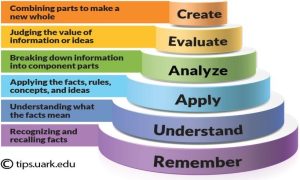
The Bloom’s Taxonomy is to be followed in curriculum development, courseware development, planning and delivery of contents, Assessment, Mapping, Data Analysis and CQI (Continuous Quality Improvement)
INFRASTRUCTURE
Aerospace Engineering
Aerospace Engineering Department was established in year of 2017 with an intake of 60, affiliated under VTU with AICTE recognition to meet the intensifying needs for Aerospace Industries. Aerospace Engineering is the primary field of engineering concerned with the design development and launching of satellite launch vehicle, defense missiles and satellites for different applications. Aerospace Engineering curriculum consist of mainly fundamental aerodynamics, structures and propulsion subjects of aeronautical engineering and mechanical engineering in lower semesters and in higher semesters specialized topics like satellite launch vehicles design and analysis, Missile Design, Spacecraft design and analysis, Space dynamics, Intra planetary travels and Space environment. India is one of the leading countries in the aerospace field. To support the current and future challenges in the field of aerospace, ACSCE formulates quality engineers specialized in aerospace technology.
The Aerospace Engineering Department at ACS College of Engineering was established in 2017 with an intake capacity of 60 students. Affiliated with Visvesvaraya Technological University (VTU) and recognized by AICTE, the department is dedicated to meeting the evolving needs of the aerospace industry. The department achieved NBA accreditation in 2024, reflecting its commitment to delivering high-quality education and maintaining global standards.
The department boasts a team of highly qualified and experienced faculty members dedicated to excellence in teaching, research, and innovation. The department has received various research fundings from prestigious organizations such as DRDO, DRDL, ISRO, and others, supporting cutting-edge research and development projects in aerospace technology.
The department is equipped with state-of-the-art facilities, including an ISRO-sponsored IRNSS Data Centre, a Satellite Tracking and Telemetry Lab, a Solid Rocket Propellant Testing Setup, a Smart Flight Simulator, and a High-Performance Computing Lab Facility sponsored by ARDB. These facilities provide students with hands-on learning experiences and exposure to cutting-edge aerospace technologies.
The curriculum is designed to blend core principles of Aerodynamics, Structures, and Propulsion in the early semesters with advanced topics such as Satellite Launch Vehicle Design and Analysis, Missile Design, Spacecraft Design and Analysis, Space Dynamics, Interplanetary Travel, and Space Environment in the later semesters.
The department also fosters industry-academia collaboration through its Aeronautical Sector Skill Council (ASSC) Student Chapter, established in association with Jet Aerospace and Aviation Centre, Palakkad, to enhance students’ skills and industry readiness.
India’s position as a global leader in the aerospace sector drives the department’s vision of producing skilled engineers equipped to tackle current and future challenges in aerospace technology.
Quality Policy
- To provide competitive and academic programs to produce technologists and professionals for national and global needs.
- To be a centre for reference, research and consultation through smart partnership with industries and stake holders.
- Educate tomorrow’s leaders through innovative educational programs & pedagogies that have as their context the conception, design, implementation and operation of systems; and processes; create research opportunities that generate inventions, technologies and solutions to Aerospace problems
VISION
The Aerospace Department seeks to nurture creativity among the students for shaping the next generation of aerospace systems.MISSION
- To provide capable, motivated, and high quality aerospace engineering students, that will enable them to reach their maximum potential in the technological world.
- To significantly advance the knowledge of the students and integrate them in aerospace related disciplines.
- To perform research that is timely and of importance to society, which coincide with relevant interests in the engineering community and the community at large.
PROGRAM EDUCATIONAL OBJECTIVES (PEO’S)
- PEO-1 PROFESSIONAL KNOWLEDGE: Aerospace Graduates will have the ability to apply knowledge across the disciplines and in emerging areas of Aerospace Engineering for higher studies, research, employability and product development.
- PEO-2 LEADERSHIP SKILLS: Graduates possess academic excellence, managerial skills, leadership qualities and understand the need for lifelong learning for a successful professional career.
- PEO-3 ATTITUDE DEVELOPMENT: Graduates will have the communication skills, sense of responsibility to protect the environment and ethical conduct towards their profession and commitment to serve the society.
Program Specific Outcomes (PSO’s)
- PSO 1. Professional Skills : Apply the knowledge of aerospace engineering in innovative, dynamic and challenging environment for design and development of flight/space vehicles through simulation, Programming skills and general-purpose CAE packages.
- PSO 2. Practical implementation and Testing Skills : Providing different types of in-house training and industry practice to fabricate, test and develop the products with more innovative technologies.
- PSO 3. Successful Career and Entrepreneurship : To prepare the students to become technocrats with broad aerospace knowledge for design and development of systems and subsystems for aerospace and associated fields.
PROGRAM OUTCOME (POs)
- PO1 – Engineering Knowledge: Apply knowledge of mathematics and science, with fundamentals of Aerospace Engineering to be able to solve complex engineering problems related to Aerospace Engineering
- PO2 – Problem Analysis: Identify, Formulate, review research literature and analyse complex engineering problems related to Aerospace Engineering and reaching substantiated conclusions using first principles of mathematics, natural sciences and engineering sciences.
- PO3 – Design/Development of solutions: Design solutions for complex aircraft problems related to Aerospace Engineering and design system components or processes that meet the specified needs with appropriate consideration for the public health and safety and the cultural societal and environmental considerations.
- PO4 – Conduct Investigations of Complex problems: Use research–based knowledge and research methods including design of Aircraft and Aerospace structure experiments, analysis and interpretation of data, and synthesis of the information to provide valid conclusions.
- PO5 – Modern Tool Usage: Create, Select and apply appropriate techniques, resources and modern engineering and IT tools including prediction and modelling to Aerospace Engineering related complex engineering activities with an understanding of the limitations.
- PO6 – The Engineer and Society: Apply Reasoning informed by the contextual knowledge to assess societal, health, safety, legal and cultural issues and the consequent responsibilities relevant to the Aerospace professional engineering practice.
- PO7 – Environment and Sustainability: Understand the impact of the Aerospace professional engineering solutions in societal and environmental contexts and demonstrate the knowledge of, and need for sustainable development.
- PO8 – Ethics: Apply Ethical Principles and commit to professional ethics and responsibilities and norms of the engineering practice.
- PO9 – Individual and Team Work: Function effectively as an individual and as a member or leader in diverse teams and in multidisciplinary Settings.
- PO10 – Communication: Communicate effectively on complex engineering activities with the engineering community and with High society and with write effective reports and design documentation, make effective presentations and give and receive clear instructions.
- PO11 – Project Management and Finance: Demonstrate knowledge and understanding of the engineering management principles and apply these to one’s own work, as a member and leader in a team, to manage projects and in multi-disciplinary environments.
- PO12 – Life-Long Learning: Recognize the need for and have the preparation and ability to engage in independent and life-long learning the broadest content of technological change.
Department Profile
Karnataka State is the hub of various Aerospace industries. With the intensions to fulfil the increasing demands of skilled manpower in these industries and hence to serve the society, the Department of Aerospace Engineering was established in year 2017 with under Graduate Course in Bachelor of Engineering in Aerospace Engineering under VTU, Belgaum. The course is approved by AICTE, New Delhi. Aerospace Engineering curriculum consist of fundamental subjects like aerodynamics, structures and propulsion in lower semesters and in higher semesters specialized topics like Launch Vehicles design and analysis, Missile Design, Spacecraft design and analysis, Space dynamics, Intra planetary travels and Space environment. On successful completion of the course the student may get opportunities to join various Aerospace industries like ISRO, DRDO, GTRE, HAL, NAL, Boeing, Airbus, Honeywell, TCS, Goodrich, Mahindra Aerospace, Accord Systems, Data Patterns, Servo controls, Dassault – Reliance Aerospace, Safran Engineering Services, Aequs etc.JRF Recruitment Notice
Applications are invited from the eligible candidates for the Junior Research Fellow Post for the ARDB-funded research project titled “Prediction of Aerodynamics Characteristics of Grid Fins at Subsonic, Transonic and Supersonic Flows“
JRF recruitment circularAerospace – Infrastructure
Facilities
Smartfly Advent Flight Simulator:
The SmartFly Advent Flight Simulatoris an Open frame fixed base Aviation Ground flying trainer simulator run by custom build PCs (server client model) with 3-channel visual LCD/LED monitor for displaying visual environment with exclusive instrument gauges display. Single control yoke having continuously adjustable pitch/roll control and single rudder pedal for yaw control with differential brakes. The operational physical controls such as, switch pack, Throttle, Propeller and Mixture unit, Flaps with LED flap position indicator, landing Gear with position indicators, Trim wheel, Gauge control, digital radio avionics stack, GP500 GPS module and external Instructor operating station are available. The digital avionics radio stack gives the best training environment to practice radio and flight navigation procedures. Multiple instruments like ASI, VSI, AM, MM, AI, GH, etc are available. Moving map with flight review, vertical and horizontal flight path with ILS/VOR is available in the simulator. Flight planning and multi aircraft configuration can also be done with this simulator.Highlights of the Simulator:
- Learn & practice the concept of maneuvering, Navigation under visual or instrument flight conditions.
- Innovative instructor station puts student /trainee into various situations including weather, system and instrument failures etc. to master the procedures.
- Digital Avionics Radio stack gives the best training environment to practice radio and Flight navigation procedures.
- Become proficient and master flying Visual Flight Rules /Instrument Flight Rules under Instrument meteorological conditions day or night to almost any airport in the world.
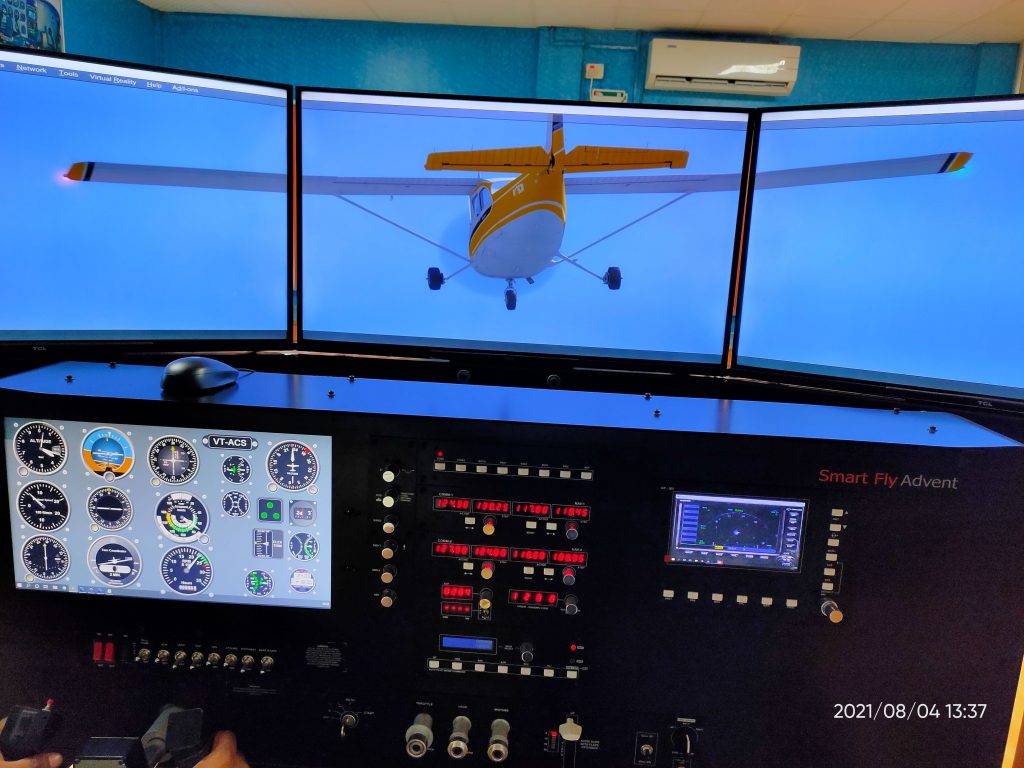 Indian Regional Navigation Satellite System (IRNSS/NavIC) Data Centre
Space Application Centre (SAC), ISRO, Ahmedabad has tied up with ACS College of Engineering to test its new navigation system, IRNSS (Indian Regional Navigation Satellite System). The two receivers installed in the institute provides time and position related data in real time. The initiative is aimed at capacity building and thereby facilitating research studies among students.The Receiver is for experimentation, field trials and collection of data from the IRNSS or NavIC constellation and also a Multi View GNSS receiver is sponsored by the management for different satellite constellation analysis.
Indian Regional Navigation Satellite System (IRNSS/NavIC) Data Centre
Space Application Centre (SAC), ISRO, Ahmedabad has tied up with ACS College of Engineering to test its new navigation system, IRNSS (Indian Regional Navigation Satellite System). The two receivers installed in the institute provides time and position related data in real time. The initiative is aimed at capacity building and thereby facilitating research studies among students.The Receiver is for experimentation, field trials and collection of data from the IRNSS or NavIC constellation and also a Multi View GNSS receiver is sponsored by the management for different satellite constellation analysis.
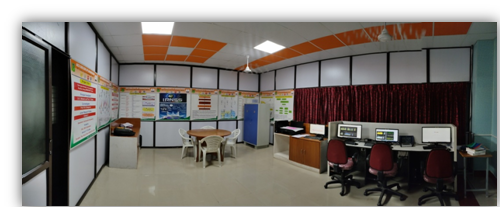 Propulsion Lab
Propulsion Lab
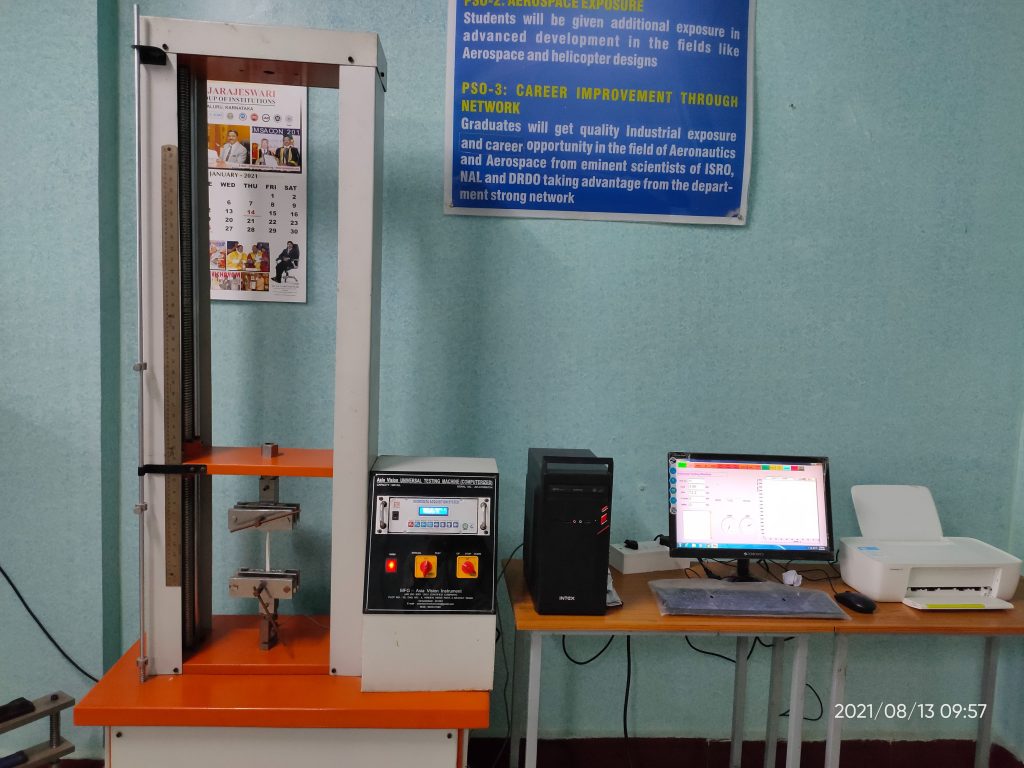 Universal Testing Machine – Specially designed for Rocket Propellant Testing. The UTM Provides a relatively inexpensive way for determining the Tensile, Compression, Shear Strength and elongation of variety of raw materials.
Universal Testing Machine – Specially designed for Rocket Propellant Testing. The UTM Provides a relatively inexpensive way for determining the Tensile, Compression, Shear Strength and elongation of variety of raw materials.
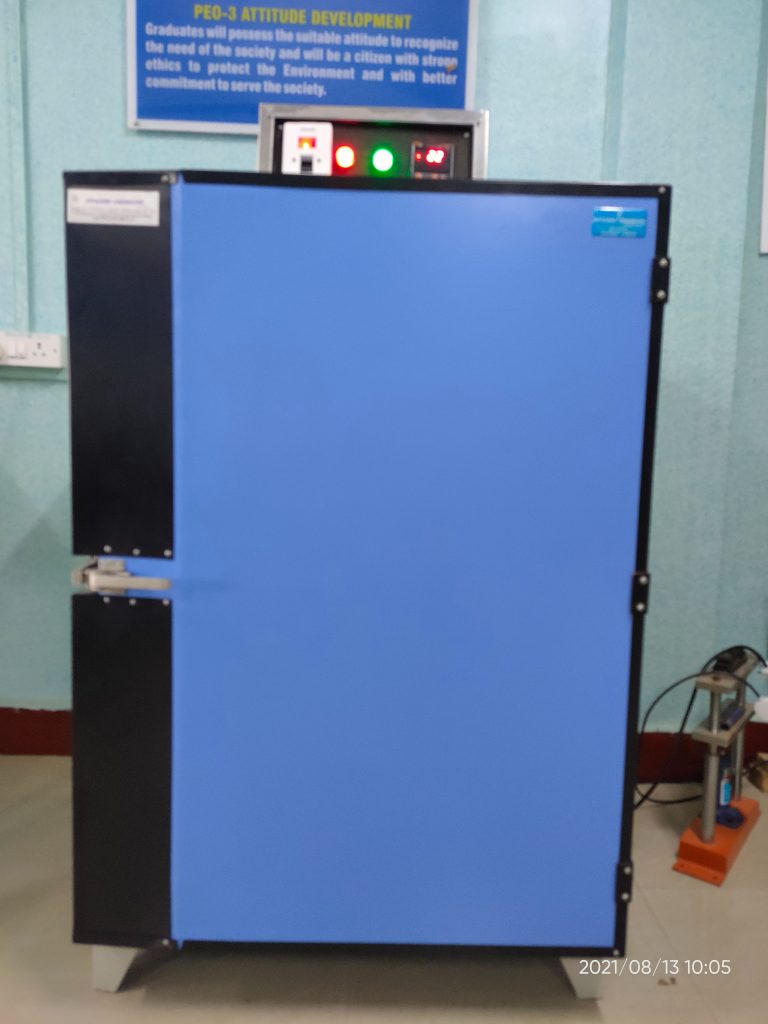 Tumansky R – 25 – 300 Series Supersonic Jet Engine
The Russian Tumansky R – 25 – 300 Series Engine was built under license by HAL in India for MIG 21 BIS fleet aircraft. It is a supersonic jet engine with straight flow. The engine is having a feature of axial flow turbo jet engine with increased overall pressure ratio and airflow. It has a twin spool axial flow 8 stage compressor which comprises of 3 stage low pressure compressor and 5 stage high pressure compressor. The engine is having 10 can annular type combustion chambers. The fuel and air mixture inside the combustion chamber is ignited by torch ignitors. The reaction type turbine contains 2 stages, among that one is high pressure stage and another one is low pressure stage. The turbine inlet temperature is 1040 deg Celsius. It has a second fuel pump in the after-burner stage. The engine is having variable jet nozzle. The length of the engine is 4615 mm which can produce a maximum thrust of 40. 3 kN without afterburner and also it can produce a thrust of 69.6 kN with after burner switched on condition. The fuel used in this engine is Kerosene ATF, T1, TC1 and T2.
The Tumansky R – 25 – 300 engine available in ACSCE was partially cutdown and projected in transparent mode for visualizing the inner parts of the engine. The engine compressor is attached with a variable RPM motor for demonstration purposes. It will be helpful for the students to get deep knowledge about the various components and working principle of the Jet engine in detail.
Tumansky R – 25 – 300 Series Supersonic Jet Engine
The Russian Tumansky R – 25 – 300 Series Engine was built under license by HAL in India for MIG 21 BIS fleet aircraft. It is a supersonic jet engine with straight flow. The engine is having a feature of axial flow turbo jet engine with increased overall pressure ratio and airflow. It has a twin spool axial flow 8 stage compressor which comprises of 3 stage low pressure compressor and 5 stage high pressure compressor. The engine is having 10 can annular type combustion chambers. The fuel and air mixture inside the combustion chamber is ignited by torch ignitors. The reaction type turbine contains 2 stages, among that one is high pressure stage and another one is low pressure stage. The turbine inlet temperature is 1040 deg Celsius. It has a second fuel pump in the after-burner stage. The engine is having variable jet nozzle. The length of the engine is 4615 mm which can produce a maximum thrust of 40. 3 kN without afterburner and also it can produce a thrust of 69.6 kN with after burner switched on condition. The fuel used in this engine is Kerosene ATF, T1, TC1 and T2.
The Tumansky R – 25 – 300 engine available in ACSCE was partially cutdown and projected in transparent mode for visualizing the inner parts of the engine. The engine compressor is attached with a variable RPM motor for demonstration purposes. It will be helpful for the students to get deep knowledge about the various components and working principle of the Jet engine in detail.
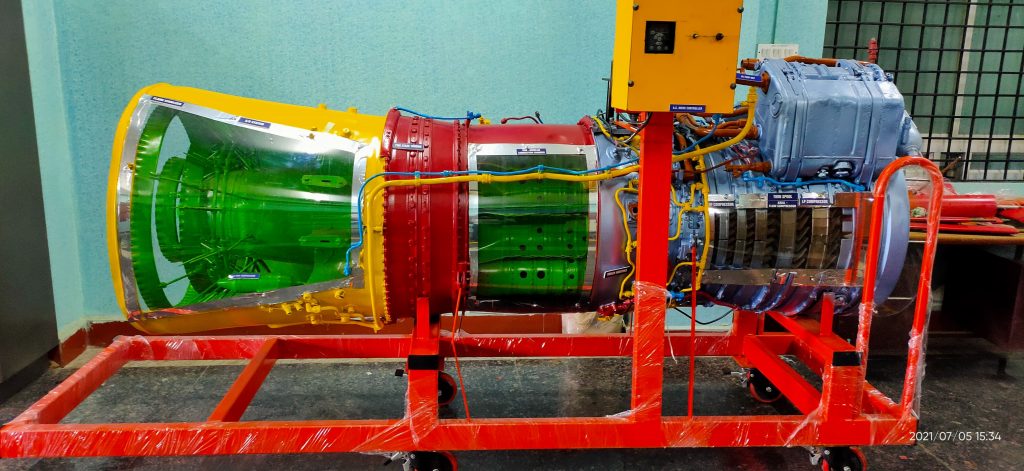 Avionics and Instrumentation Lab
Avionics is a combination of Aviation and Electronics. Avionics laboratory provides opportunities to Aerospace students to have better understanding of electronic components used in various Aircrafts, rockets, missiles and spacecrafts. This lab comprises of experiments which deals with digital electronics, microprocessors,aircraft instruments and MIL-1553B data bus. The experiment related to the Digital Electronics helps the students to understand in detail a complex problem statement into simple logical expressions that could be addressed with minimum number of gates. These experiments provide an ideology of miniaturization of electronic circuits that were used in Aerospace field. The programming of microprocessor would aid the students to have an idea on Auto Pilot system where an Auto pilot system designer must have the capability to work with sensors & interpret the data from real time environment with that of it. The experiment related to Avionics data bus aids the student to have an understanding of how a data bus carries data to different subunits.
GSLV MK III and Akash Missile
The Department is having GSLV MK III and Akash Missile prototype models for study purposes.
Avionics and Instrumentation Lab
Avionics is a combination of Aviation and Electronics. Avionics laboratory provides opportunities to Aerospace students to have better understanding of electronic components used in various Aircrafts, rockets, missiles and spacecrafts. This lab comprises of experiments which deals with digital electronics, microprocessors,aircraft instruments and MIL-1553B data bus. The experiment related to the Digital Electronics helps the students to understand in detail a complex problem statement into simple logical expressions that could be addressed with minimum number of gates. These experiments provide an ideology of miniaturization of electronic circuits that were used in Aerospace field. The programming of microprocessor would aid the students to have an idea on Auto Pilot system where an Auto pilot system designer must have the capability to work with sensors & interpret the data from real time environment with that of it. The experiment related to Avionics data bus aids the student to have an understanding of how a data bus carries data to different subunits.
GSLV MK III and Akash Missile
The Department is having GSLV MK III and Akash Missile prototype models for study purposes.
Department of Chemistry
Overview
ACS College of Engineering, an institution of academic excellence, was established in the year 2009 with a cherished desire to serve the cause of humanity through education. This college is affiliated to Visvesvaraya Technological University, Belagavi and has been approved by the All India Council of Technical Education, New Delhi. The College offers technical education in a range of engineering disciplines including new age ones such as Aeronautical Engineering and Bio-Medical Engineering. ACSCE equips its students not only with the technical knowledge to enable them to meet the challenges of global standards but also integrates value education, environmental awareness and communication skills into its curriculum to mould the students as responsible citizens. The college is located in a beautiful lush green landscape, free from a polluted environment and excellent atmosphere and ambience ideally suited for growth of the soul & mind. It is located behind RRMCH on the Bengaluru-Mysore Highway 15 Km from the Bengaluru City Railway Station and 2km from Kengeri Railway Station. The Institute has a strong anti ragging committee which is very proactive in looking after the whole college 24X7 including hostels.
Mission
Engineering the future of the nation by transforming the students to be technically skilled managers, innovative leaders and environmentally receptive citizens.
Vision
To implement holistic approach in curriculum and pedagogy through Industry Integrated Interactions to meet the needs of Global Engineering Environment. To develop students with knowledge, attitude and skill of employability, entrepreneurship (Be Job creators than job seekers), research potential and professionally ethical citizens.








